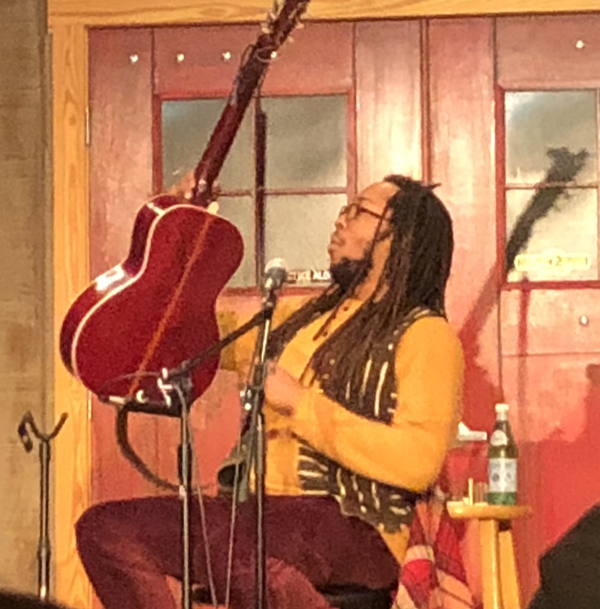Hubby Jenkins was tuning up to play “I Am the Light of this World” when one of his guitar strings snapped.
Rather than pause his concert at Jorma Kaukonen’s Fur Peace Ranch, Jenkins simply launched into an a cappella rendition of “Jesus Make up My Dying Bed” as he casually restrung his instrument and the audience reverently tapped out a beat with their feet on the floor.
Guitar ready to go, Jenkins resumed his regularly scheduled programming – actually he played sans setlist and carefully pondered each selection as the night wore on – and segued from Blind Willie Johnson to the Rev. Gary Davis classic that the ranch’s proprietor has played on that same stage and around the world many, many times before.
This was the second of two sets – the gospel portion of the show – Jenkins played Oct. 20 to a sold-out house in Pomeroy, Ohio. Early in the 65-minute sermon-cum-concert’s back half, multi-instrumentalist Larry Campbell emerged from the wings with a fiddle and engaged the former Carolina Chocolate Drop in a foot-stomping, instrumental duet on which Campbell laid down the melody while Jenkins provided the rhythm on bones. It was the only song for which Jenkins stood and elicited the loudest ovation of the evening for its sheer exuberance and the smiling Campbell’s obvious pleasure at being there.
He followed with a bones-and-vocals rendition of “Moses, Don’t Get Lost,” another spiritual that briefly turned the tiny Fur Peach Station concert hall into a rural house of worship.
This was a fascinating concert, musically, spiritually and intellectually.
Prior to taking the audience to church, Jenkins took them to school, using his brief, 45-minute first set to educate concertgoers not only about the African origins of the banjo he was playing but the evolution of African-American culture and stereotypes via slavery, the Black Codes and Jim Crow and the minstrel tradition. Infusing his banter with banjo tracks like “The Little Old Log Cabin in the Lane,” which told the story of a former slave circa the 1880s who allegedly missed being in bondage, and the a cappella “We Are Stole and Sold,” which painted a more realistic picture of America’s so-called peculiar institution, Jenkins made sure his fans were not only entertained, but that they left his concert smarter than they were when they arrived.
Calling himself, “your friend, Hubby Jenkins,” he explained his tunings to the Fur Peach students in the front rows as he covered songs by Fred McDowell, Bukka White and the Chocolate Drops’ mentor, the North Carolinian Joe Thompson. He played low-down-and-dirty slide guitar on Robert Johnson’s “Last Fair Deal Gone Down,” got folksy on the traditional “Walking Boss” and sung about the joys of ramblin’ on “Railroadin’ and Gamblin’” and the rigors of prison life on “Parchman Blues.”
And when Jenkins returned for his encore, a quick version of the Staple Singers’ “When Was Jesus Born,” he had the audience primed for the call-and-response nature of the track, which is a sure bet to appear on the gospel album that’s marinading in Jenkins’ mind.



No Comments comments associated with this post